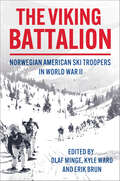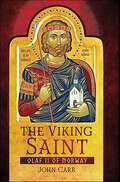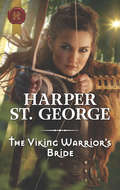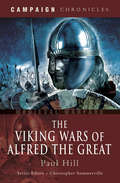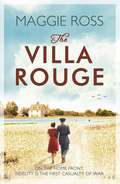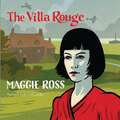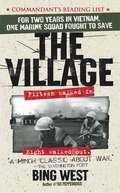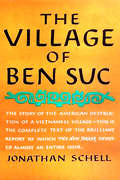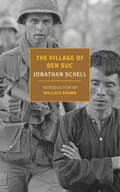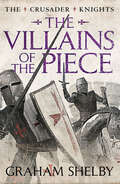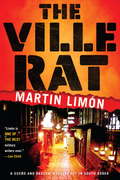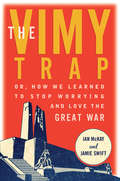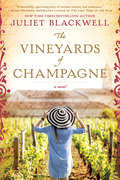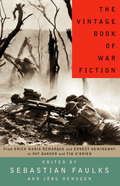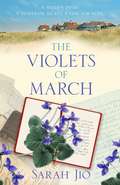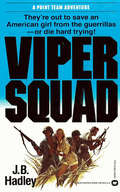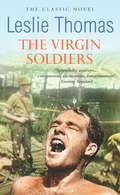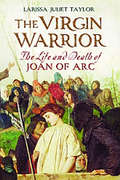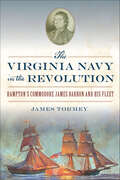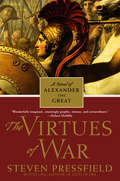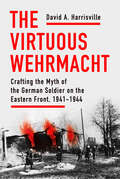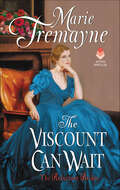- Table View
- List View
The Viking Battalion: Norwegian American Ski Troopers in World War II
by Kyle Ward Olaf Minge"What is engaging about this book is that you get to hear the authentic voices of the soldiers through their memoirs, journal entries, and letters. Some are long, some are short, but all are worth reading for the insights you get into the minds of the ordinary soldier and what catches his eye." — The Norwegian American Hidden in the crevasses of World War II history is the story of the 99th Infantry Battalion (Separate). A small unit that rarely gets any attention, it is part of a fascinating story. Alongside battalions of Austrian, Greek, Filipino and Japanese Americans, the Army decided to create an all Norwegian American battalion, originally trained at Camp Hale, Colorado, along with the 10th Mountain Division, with the original mission of liberating Norway. Their exploits during training brought them enough notoriety that members of the 99th were recruited to start the First Special Service Force and a branch of the OSS. Although they were not initially sent to Norway, they would fight in Normandy, across France and Belgium, helped entrap the Germans at Aachen, protected the city of Malmedy during the Battle of the Bulge (where they stopped an attack by Skorzeny and a SS Panzer Division), helped liberate Buchenwald, guarded the Nazi treasures found in Merkers mine and finally served as the Honor Guard for King Haakon VII on his triumphant return to Norway. This book tells the story of the 99th Infantry Battalion through an anthology of rarely, if ever, previously seen memoirs, journals, letters and newspaper articles written by or about the Viking soldiers.
The Viking Saint: Olaf II of Norway
by John CarrThe Vikings and sainthood are not concepts normally found side by side. But Norway’s King Olaf II Haraldsson (c. 995-1030) embodied both to an extraordinary degree. As a battle-eager teenager he almost single-handedly pulled down London Bridge (as in the nursery rhyme) and took part in many other Viking raids . Olaf lacked none of the traditional Viking qualities of toughness and audacity, yet his routine baptism grew into a burning missionary faith that was all the more remarkable for being combined with his typically Viking determination and energy – and sometimes ruthlessness as well. His overriding mission was to Christianize Norway and extirpate heathenism. His unstinting efforts, often at great peril to his life, earned him the Norwegian throne in 1015, when he had barely reached his twenties. For the next fifteen years he laboured against immense odds to subdue the rebellious heathen nobles of Norway while fending off Swedish hostility. Both finally combined against Olaf in 1030, when he fell bravely in battle not far from Trondheim, still only in his mid-thirties. After his body was found to possess healing powers, and reports of them spread from Scandinavia to Spain and Byzantium, Olaf II was canonized a saint 134 years later. He remains Norway’s patron saint as well as a legendary warrior. Yet more remarkably, he remains a saint not only of the Protestant church but also of the Roman Catholic and Greek Orthodox Churches – perhaps the only European fighting saint to achieve such acceptance.
The Viking Warrior's Bride: A Passionate Viking Romance (Viking Warriors)
by Harper St. GeorgeA battle for power and passionA skilled archer with the heart of a warrior, Gwendolyn of Alvey has proved herself capable of defending her homeland. But the threat of invasion and her father’s deathbed wish force her to do the unthinkable: wed Vidar, leader of the enemy.Duty to form an alliance between two powerful clans binds Vidar to Gwendolyn, but desire tempts him to distraction. Her nature is to dominate, but he’s determined to seduce her into submission on the battlefield—and in the bedchamber…
The Viking Wars of Alfred the Great: Campaign Chronicles
by Paul HillIn the spring of 878 at the Battle of Edington the tide of English history turned. Alfred's decisive defeat of Guthrum the Dane freed much of the south and west of England from Danish control and brought to a halt Guthrum's assault on Alfred's Wessex. The battle was the culmination of a long period of preparation by Alfred in the wilderness - a victory snatched from the jaws of catastrophic defeat. As such, this momentous turning point around which an entire nation's future pivoted, has given rise to legends and misconceptions that persist to the present day. Paul Hill, in this stimulating and meticulously researched study, brings together the evidence of the medieval chronicles and the latest historical and archaeological research to follow the struggle as it swung across southern England in the ninth century. He dispels the myths that have grown up around this critical period in English history, and he looks at Alfred's war against the Vikings with modern eyes.
The Villa Rouge
by Maggie RossMorgan Perincall's marriage is already disintegrating when her husband volunteers for service in France. Dazed by his desertion, she sends their children west to safety, and leaves London for the dubious sanctuary of her childhood home, the Villa Rouge. Situated on the East coast, it is vulnerable to German attack. Caught between the open hostility of her father's housekeeper and the suffocating affection of Charlie, who for all his enthusiasm is not fit for service, Morgan's days are brightened by the arrival of an R.A.F. squadron - a chance to relive the romances of her wilder youth. But the fall of Dunkirk brings a sobering taste of defeat, and the Battle of Britain soon sees the once-carefree pilots fighting for their lives, their country. With danger drawing ever closer, and the secrets of her past beginning to unravel, Morgan discovers that sometimes the best intentions can leave the darkest legacies.
The Villa Rouge
by Maggie RossMorgan Perincall's marriage is already disintegrating when her husband volunteers for service in France. Dazed by his desertion, she sends their children west to safety, and leaves London for the dubious sanctuary of her childhood home, the Villa Rouge. Situated on the East coast, it is vulnerable to German attack. Caught between the open hostility of her father's housekeeper and the suffocating affection of Charlie, who for all his enthusiasm is not fit for service, Morgan's days are brightened by the arrival of an R.A.F. squadron - a chance to relive the romances of her wilder youth. But the fall of Dunkirk brings a sobering taste of defeat, and the Battle of Britain soon sees the once-carefree pilots fighting for their lives, their country. With danger drawing ever closer, and the secrets of her past beginning to unravel, Morgan discovers that sometimes the best intentions can leave the darkest legacies.(P)2015 WF Howes Ltd
The Village
by Bing WestThe true story of seventeen months in the life of a Vietnamese village where a handful of American Marines and Vietnamese militia lived and died together attempting to defend it.In Black Hawk Down, the fight went on for a day. In We Were Soldiers Once & Young, the fighting lasted three days. In The Village, one Marine squad fought for 495 days—half of them died. Few American battles have been so extended, savage and personal. A handful of Americans volunteered to live among six thousand Vietnamese, training farmers to defend their village. Such &“Combined Action Platoons&” (CAPs) are now a lost footnote about how the war could have been fought; only the villagers remain to bear witness. This is the story of fifteen resolute young Americans matched against two hundred Viet Cong; how a CAP lived, fought and died. And why the villagers remember them to this day.
The Village of Ben Suc
by Jonathan SchellBen Suc was a relatively prosperous farming village thirty miles from Saigon, on the edge of the Iron Triangle, the formidable Vietcong stronghold. It had been "pacified" many times, but because of security leaks no Vietcong were ever captured, and it always reverted to them. Therefore on January 8, 1967, American forces launched a surprise assault kept secret even from their South Vietnamese allies. The plan was to envelop the village, to seal it off, to remove its inhabitants, to destroy its every physical trace, and to level the surrounding jungle. Jonathan Schell accompanied the operation from its beginning to its successful but dismal end, and reports it in depth as he saw it. This time no one slipped away. The story of the bewildering task of separating the V.C. from ordinary villagers is the dramatic core of the first part of this book. The 3,500 villagers were moved to a refugee camp in Phu Loi, a barren, treeless "safe" area, with only what possessions they could carry. The bulldozers went to work and flattened every building. For security reasons no advance preparations had been made, and the move became a human and administrative nightmare. The people of Ben Suc were farmers, and there was nothing for them to do at Phu Loi, Mr. Schell offers vivid portraits of one individual after another--women, children, old men--as they are pacified and sink into apathy and despair. Here is an overwhelmingly affective narrative of American skill and good intentions squandered in a cause made hopeless by misunderstanding, by resistant traditions, and by cultural gaps not only between ourselves and the villagers, but between them and the Saigon government. Mr. Schell's report is devastating.
The Village of Ben Suc
by Jonathan SchellWith a new introduction by Wallace Shawn, a classic work of war reportage that describes, with unblinking vision, the systematic leveling of a Vietnamese village by American troops.In January 1967, as President Lyndon Johnson sent more forces to the war in Vietnam, the US military began what was to be the largest ground operation of the entire conflict. Not far from Saigon, the capital of South Vietnam, and close to the Cambodian border was an area known as the Iron Triangle, long under Viet Cong control. Operation Cedar Falls set out to eliminate that guerrilla threat by sealing off the region, emptying its villages, and leveling the surrounding jungle. The local population would be transferred to model "New Life Villages" under US surveillance.The village of Ben Suc was the Americans' first target, and Jonathan Schell, a reporter at the start of his career, accompanied them there. He witnessed the destruction of the village; the frantic efforts of young soldiers to figure out who was or wasn't a foe; the destruction of people's homes and possessions; and the chaotic transfer of women, children, old men, and livestock to a refugee camp where no preparations had been made for their arrival. He described it all in measured tones and unflinching detail. As a cautionary tale about the unintended and devastating consequences of military occupation, The Village of Ben Suc remains unequaled. "Schell's book might have been the crystal ball that could have led American policymakers to realize that quasi-imperial American interventions of this type could not succeed in the contemporary world, and if the policymakers had read Schell's book and studied it carefully, who knows, maybe a million or more Vietnamese lives could have been saved, along with the lives of fifty thousand American soldiers, along with countless lives in Afghanistan and Iraq." —From Wallace Shawn's Introduction.
The Villains of the Piece (The Crusader Knights Cycle)
by Graham ShelbyRoyal intrigue and deadly deceit abound in this epic historical adventure of the Crusader Knights England 1134: These are the years of the long, bloody civil war over the succession of Henry I – a conflict between the supporters of Henry's daughter and rightful heir, the beautiful and tyrannical Matilda, and her cousin, the usurper Stephen of Blois, a just and decent man but with no lawful claim to the throne.This is a war in which even partisans can change sides according to who holds the advantage – a war in which there is little courage, much deceit, and barely any honour.The sole exception is Brien Fitz Count, Lord of Wallingford, friend of Stephen's but true to his vow of support for Matilda. He, his wife Alyse, and their retainers make of their small, strategic castle a fortress and rallying point, holding it against siege and worse at immense personal cost…This epic third instalment of The Crusader Knights Cycle is perfect for fans of Conn Iggulden, Peter Darman and Bernard Cornwell.‘History with a dramatist’s eye for a fine setting and a novelist’s insight into human minds and motives’ The Times Literary Supplement
The Ville (Vietnam Ground Zero #9)
by Eric HelmUnited States Army Captain Jonathan Bromhead spearheads a Special Forces mission into the Laotian highlands to train a group of Meo tribesmen to hamper enemy traffic on the Ho Chi Minh Trail. <P><P> But Bromhead is double shocked by his discovery in the Meo settlement. The villagers demonstrate little more than a primitive culture, and an American anthropologist studyng the tribe is adamant they should be let alone.<P> "It isn't right to bring them into your war," Jane Lucas tells Bromhead.<P> "They'll be involved whether we stay or not. The war has spilled over from South Vietnam into Laos and Cambodia. Find someone else to study."<P> "I knew it. You're just another pawn of the Pentagon."<P> Despite the heated debate, the captain carries out his orders. But before training is complete, Bromhead's worst fear is realized. The NVA launches a devastating attack on the village.
The Ville Rat
by Martin LimonHow much can murder, and silence, buy on the black market of 1974 South Korea? South Korea, 1970s: A young Korean woman dressed in a traditional chima-jeogori is found strangled to death on the frozen banks of the Sonyu River with only a carefully calligraphed poem in her sleeve. George Sueño and Ernie Bascom, sergeants in the US 8th Army CID, are called in by the formidable KNP detective Gil Kwon-up to investigate. George and Ernie's job is to liaise with Korean law enforcement on matters that may involve or implicate 8th Army American servicemen. But as they learn about the case, George and Ernie realize this isn't their jurisdiction--the nearby village of Sonyu-ri is occupied by the US Army's 2nd Infantry Division, a disciplined and often brutal force that won't stand for outside officers questioning its men. All that George and Ernie are able to glean before being kicked out of town is that they are close to the truth--and that a mysterious smuggler, known locally as "the Ville Rat," holds the key to the woman's murder.Luckily, the pair is officially assigned another investigation in the area, which allows them to continue nosing around for answers. They are to elucidate the circumstances of a shooting incident between a young African American private and his white supervising chief. Racial tensions run high, and George and Ernie must tread carefully to solve both cases. But they aren't exactly known for going out of their way to avoid stepping on US Army toes, and this is no exception.From the Hardcover edition.
The Vimy Trap: or, How We Learned To Stop Worrying and Love the Great War
by Jamie Swift Ian McKayThe story of the bloody 1917 Battle of Vimy Ridge is, according to many of today’s tellings, a heroic founding moment for Canada. This noble, birth-of-a-nation narrative is regularly applied to the Great War in general. Yet this mythical tale is rather new. “Vimyism”— today’s official story of glorious, martial patriotism—contrasts sharply with the complex ways in which veterans, artists, clerics, and even politicians who had supported the war interpreted its meaning over the decades. Was the Great War a futile imperial debacle? A proud, nation-building milestone? Contending Great War memories have helped to shape how later wars were imagined. The Vimy Trap provides a powerful probe of commemoration cultures. This subtle, fast-paced work of public history—combining scholarly insight with sharp-eyed journalism, and based on primary sources and school textbooks, battlefield visits and war art—explains both how and why peace and war remain contested terrain in ever-changing landscapes of Canadian memory.
The Vineyards of Champagne
by Juliet BlackwellBeneath the cover of France's most exquisite vineyards, a city of women defy an army during World War I, from the New York Times bestselling author of The Lost Carousel of Provence.... Deep within the labyrinth of caves that lies below the lush, rolling vineyards of the Champagne region, an underground city of women and children hums with life. Forced to take shelter from the unrelenting onslaught of German shellfire above, the bravest and most defiant women venture out to pluck sweet grapes for the harvest. But wine is not the only secret preserved in the cool, dark cellars... In present day, Rosalyn Acosta travels to Champagne to select vintages for her Napa-based employer. Rosalyn doesn't much care for champagne--or France, for that matter. Since the untimely death of her young husband, Rosalyn finds it a challenge to enjoy anything at all. But as she reads through a precious cache of WWI letters and retraces the lives lived in the limestone tunnels, Rosalyn will unravel a mystery hidden for decades...and find a way to savor her own life again.
The Vintage Book of War Fiction
by Sebastian Faulks Jorg HensgenIn this powerful anthology, Sebastian Faulks, author of the international bestseller Birdsong, and Jörg Hensgen have put together some of the finest fictional writing about war in the 20th century. Whether reporting with sober clarity or raw despair, the assembled novelists each found a way to transcend the facts of death and metal, tanks and blood. Many of the writers are concerned with battle, but others dwell on moments of calm, love, and friendship. From revolutionary Russia to Republican Spain; from the trenches of the Western Front to the skies over Korea and the jungles of Vietnam, this is a book filled with heroism and horror, savagery and compassion, and lightning-flashes of anarchic humor.
The Violent American Century: War and Terror Since World War II (Dispatch Books)
by John W. Dower&“Tells how America, since the end of World War II, has turned away from its ideals and goodness to become a match setting the world on fire&” (Seymour Hersh, investigative journalist and national security correspondent). World War II marked the apogee of industrialized &“total war.&” Great powers savaged one another. Hostilities engulfed the globe. Mobilization extended to virtually every sector of every nation. Air war, including the terror bombing of civilians, emerged as a central strategy of the victorious Anglo-American powers. The devastation was catastrophic almost everywhere, with the notable exception of the United States, which exited the strife unmatched in power and influence. The death toll of fighting forces plus civilians worldwide was staggering. The Violent American Century addresses the US-led transformations in war conduct and strategizing that followed 1945—beginning with brutal localized hostilities, proxy wars, and the nuclear terror of the Cold War, and ending with the asymmetrical conflicts of the present day. The military playbook now meshes brute force with a focus on non-state terrorism, counterinsurgency, clandestine operations, a vast web of overseas American military bases, and—most touted of all—a revolutionary new era of computerized &“precision&” warfare. In contrast to World War II, postwar death and destruction has been comparatively small. By any other measure, it has been appalling—and shows no sign of abating. The author, recipient of a Pulitzer Prize and a National Book Award, draws heavily on hard data and internal US planning and pronouncements in this concise analysis of war and terror in our time. In doing so, he places US policy and practice firmly within the broader context of global mayhem, havoc, and slaughter since World War II—always with bottom-line attentiveness to the human costs of this legacy of unceasing violence. &“Dower delivers a convincing blow to publisher Henry Luce&’s benign &‘American Century&’ thesis.&” —Publishers Weekly
The Violets of March: A Novel
by Sarah JioThe island has a way of calling you home... Ten years ago, Emily Watson was on top of the world: a best-selling novel, a husband plucked from the pages of a magazine, and a one-way ticket to happily ever after.Now her perfect life has crumbled and Emily is left to pick up the pieces.So when her great-Aunt Bee invites her to spend the month of March on her beloved Bainbridge Island, Emily accepts, longing to be healed by the sea. As she begins researching her next book, Emily discovers a red velvet diary, dated 1943, whose contents reveal a startling secret that could change her life forever... A heart-breaking story of love, hope and second chances, from the international bestselling author of All the Flowers in Paris
The Viper Squad (The Point Team #2)
by J. B. HadleyA Special Forces veteran goes to the jungles of South America to save a woman.
The Virgin Soldiers
by Leslie Thomas'It rained a lot and steamed when the sun shone. It was always hot. But it was safe...'One way or another the Communist guerrilla war in Malaya kept a whole British army occupied from 1948 until 1952. They were the virgin soldiers. Idle, homesick, afraid, bored, oversexed and unsatisfied.A young virgin like Brigg had to grab his fun while and where he could - in the Liberty Club, in Juicy Lucy's flat or up in Phillipa's room - in one frantic attempt at living before he died or got demobbed...
The Virgin Warrior: The Life and Death of Joan of Arc
by Larissa Juliet Taylor&“A fresh and provocative biography of La Pucelle . . . her transformation from a naive girl to a strong-willed, bold, and gifted captain of war.&”—Frederic J. Baumgartner, author of France in the Sixteenth CenturyFrance&’s great heroine and England&’s great scourge: whether a lunatic, a witch, a religious icon, or a skilled soldier and leader, Joan of Arc&’s contemporaries found her as extraordinary and fascinating as the legends that abound about her today. But her life has been so endlessly cast and recast that we have lost sight of the remarkable girl at the heart of it—a teenaged peasant girl who, after claiming to hear voices, convinced the French king to let her lead a disheartened army into battle. In the process she changed the course of European history.In The Virgin Warrior, Larissa Juliet Taylor paints a vivid portrait of Joan as a self-confident, charismatic and supremely determined figure, whose sheer force of will electrified those around her and struck terror into the hearts of the English soldiers and leaders. The drama of Joan&’s life is set against a world where visions and witchcraft were real, where saints could appear to peasants, battles and sieges decided the fate of kingdoms and rigged trials could result in burning at the stake. Yet in her short life, Joan emboldened the French soldiers and villagers with her strength and resolve. A difficult, inflexible leader, she defied her accusers and enemies to the end. From her early years to the myths and fantasies that have swelled since her death, Taylor &“goes deep into Joan of Arc&’s heart and soul and shows us the maiden, the warrior and the heroine&” (Kate Williams, New York Times bestselling author).
The Virgin's Night Out
by Shiloh WalkerSloane Redding is the shy one, the timid one. The morning of her wedding, she's dumped by the man she'd thought she'd spend the rest of her life with. Humiliated, she turns tail and runs, leaving Nowhere, Alabama for a job in the city. Sloane sets out to remake herself. She succeeds...on the outside. On the inside? Different story. She still the shy Redding. Still quiet, still more interested in standing on the standlines. But all of that is about to change.The night before her brother's wedding, she strolls in the lone bar in Nowhere wearing wicked red and she's got one goal in mind: to show her ex-fiance just what he lost.The night before his best friend's wedding, D.B. "Boone" Cassidy walks into the lone bar in Nowhere, Alabama with one goal in mind. Get wasted. Former military, he's spent the past few years as a security specialist and all around troubleshooter. It should have been easy to spot the trouble that night...a sexy woman in wicked red. It should have been easy. Yeah, right.One thing leads to another and his plans to get wasted turn into a night with the sexy woman in red . Boone gets the shock of his life the next day when he shows up at his friend's wedding to find out he'd just spent the night wrapped around his best friend's little sister...and that isn't the only surprise.Includes a bonus story, Tempt Me
The Virginia Navy in the Revolution: Hampton’s Commodore James Barron and His Fleet (Military)
by James TormeyThe Virginia Navy, led by Commodore James Barron, raised more than fifty vessels to aid the fight against the British Empire. The ships kept open vital trade passages to the West Indies that allowed for goods and supplies to reach American shores despite English blockades. Barron defended his birthplace at the Battle of Hampton, suffered near-destruction at the hands of Benedict Arnold and supported the French navy in the decisive victory at Yorktown. Author James Tormey reveals these stories and more in a maritime adventure through the history of the Virginia Navy in the Revolutionary era.
The Virtues of War: A Novel of Alexander the Great
by Steven PressfieldI have always been a soldier. I have known no other life. So begins Alexander's extraordinary confession on the eve of his greatest crisis of leadership. By turns heroic and calculating, compassionate and utterly merciless, Alexander recounts with a warrior's unflinching eye for detail the blood, the terror, and the tactics of his greatest battlefield victories. Whether surviving his father's brutal assassination, presiding over a massacre, or weeping at the death of a beloved comrade-in-arms, Alexander never denies the hard realities of the code by which he lives: the virtues of war. But as much as he was feared by his enemies, he was loved and revered by his friends, his generals, and the men who followed him into battle. Often outnumbered, never outfought, Alexander conquered every enemy the world stood against him-but the one he never saw coming. . . .From the Trade Paperback edition.
The Virtuous Wehrmacht: Crafting the Myth of the German Soldier on the Eastern Front, 1941-1944 (Battlegrounds: Cornell Studies in Military History)
by David A. HarrisvilleThe Virtuous Wehrmacht explores the myth of the German armed forces' innocence during World War II by reconstructing the moral world of German soldiers on the Eastern Front. How did they avoid feelings of guilt about the many atrocities their side committed? David A. Harrisville compellingly demonstrates that this myth of innocence was created during the course of the war itself—and did not arise as a postwar whitewashing of events. In 1941 three million Wehrmacht troops overran the border between German- and Soviet-occupied Poland, racing toward the USSR in the largest military operation in modern history. Over the next four years, they embarked on a campaign of wanton brutality, murdering countless civilians, systemically starving millions of Soviet prisoners of war, and actively participating in the genocide of Eastern European Jews. After the war, however, German servicemen insisted that they had fought honorably and that their institution had never involved itself in Nazi crimes. Drawing on more than two thousand letters from German soldiers, contextualized by operational and home front documents, Harrisville shows that this myth was the culmination of long-running efforts by the army to preserve an illusion of respectability in the midst of a criminal operation. The primary authors of this fabrication were ordinary soldiers cultivating a decent self-image and developing moral arguments to explain their behavior by drawing on a constellation of values that long preceded Nazism. The Virtuous Wehrmacht explains how the army encouraged troops to view themselves as honorable representatives of a civilized nation, not only racially but morally superior to others.
The Viscount Can Wait (Reluctant Brides #2)
by Marie TremayneAfter five years away, Lady Eliza Cartwick isn’t relishing returning to the whirl of the London season. But the young widow knows to ensure the best future for herself and her young daughter, Rosa, she must remarry. If only Lord Evanston, the dashing rogue who has haunted her dreams since she was sixteen, didn’t insist on distracting her with his searing looks and lingering touches at the most inconvenient times . . .Thomas, Lord Evanston, has wanted Eliza since her engagement ball all those years ago. His best friend’s sister has constantly been out of reach . . . until now. The forbidden has always tempted him, but when Thomas realizes he wants the object of his fantasies for far more than a dalliance, he must convince her that he’s not just a rake; he’s a viscount who’s worth the wait.
